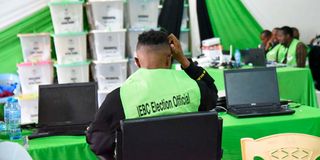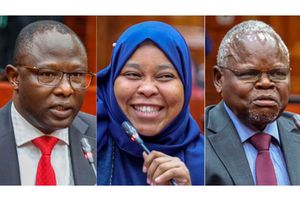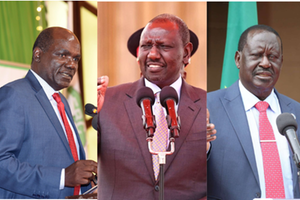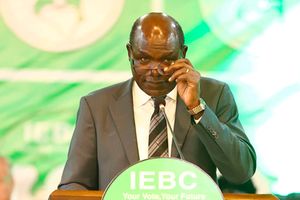
IEBC tallying clerks at Kathiani Boys High School following the conclusion of vote tallying on August 10, 2022.
The electoral commission secretariat has floated at least 60 lucrative tenders for various supplies since January 2023 in its quest to fulfil its mandate.
While some of the tenders remain open, others have closed and are in the award stage. This development comes as Parliament, on Wednesday, approved the nomination of the new Independent Electoral and Boundaries Commission (IEBC) chairperson and commissioners. However, their swearing-in has been halted by the High Court.
Tharaka MP Gitonga Murugara, who chairs the Justice and Legal Affairs Committee (JLAC) of the National Assembly, revealed that there is a proposal to allocate Sh57.1 billion to prepare for the August 2027 General Election, among other undertakings.
The proposed allocation – spread across the 2025/2026, 2026/2027, and 2027/2028 financial years – would make the 2027 election the most expensive not only in Kenya’s electoral history but globally.
For instance, in the 2025/2026 fiscal year, the commission’s proposed allocation is Sh9.3 billion. This includes Sh3.4 billion for routine operations, Sh5.12 billion for pre-election activities, and Sh0.8 billion for upcoming by-elections in at least 20 electoral areas.
Most expensive general elections
“The committee observed that the IEBC runs one of the most expensive general elections in the world,” said Mr Murugara.
“The situation has been driven by high costs of election result transmission, foreign exchange losses, and emergency airlifting of strategic materials and staff,” added the Tharaka MP.
In the absence of commissioners, the secretariat, led by CEO Marja – some of whose tenders have closed, while others are ongoing.
Mr Marjan did not respond to our inquiries, but a senior commission manager – speaking on condition of anonymity – noted that “the tendering for non-strategic materials has no direct impact on the planning for the 2027 General Election.”
“What we are doing is to help the commission, as currently constituted, function,” said the official.
According to city lawyer David Ochami, procurement of technology and strategic election materials – including ballot papers and Kenya Integrated Election Management System (Kiems) kits – is the exclusive domain of the commission. The secretariat has been operating without commissioners since the six-year terms of Chairperson Wafula Chebukati and Commissioners Abdi Guliye and Boya Molu expired in January 2023.
The IEBC was plunged into turmoil following the 2022 General Election, when four commissioners disowned the presidential results that declared UDA’s William Ruto the winner over Azimio’s Raila Odinga. Commissioners Juliana Cherera, Francis Wanderi, and Justus Nyang’aya later resigned, while Irene Masit was removed by a tribunal.
“The IEBC Act stipulates that commission decisions must be made in plenary. Only commissioners sit in plenary, and a quorum of five is required for key decisions such as procurement,” said Mr Ochami.
In the absence of commissioners, the secretariat is hamstrung in procuring election materials and cannot conduct by-elections, referenda, or the delimitation of electoral boundaries. It is also barred from recruiting senior managers or confirming acting officials to substantive roles.
The prolonged absence of commissioners has raised concerns about the commission’s capacity to effectively manage the upcoming election cycle. Experts warn that without a fully operational commission, critical decisions regarding election logistics, security, and voter education could face delays, potentially undermining the integrity of the 2027 General Election. Stakeholders have urged the High Court to expedite the clearance of the new commissioners to restore full functionality to the IEBC.
Among the tenders advertised by the secretariat is one for the supply and delivery of IEBC-branded indelible marker pens under a three-year framework contract. The open tender was floated on May 23, 2025, and closes on June 3, 2025.
A separate three-year tender for the supply of serialised IEBC official green security seals, also issued on May 23, 2025, closes on June 4, 2025.
The secretariat has also invited registration of suppliers for provision of goods, works, and services for the period ending June 30, 2027. This tender was issued on May 22, 2025, and closes on June 5, 2025.
“Interested eligible suppliers within Nairobi City County are invited to apply for various categories. Applicants are advised to indicate the reference number for the category of goods or services they wish to provide,” the tender document reads.
The tender for provision of repair and maintenance services – reserved for women – closed on May 30, 2025, having been issued on May 21.
The tender for provision of medical insurance, Group Life Assurance, and Group Personal Accident cover for commissioners and staff closed on May 13, 2025. The one-year contract will run from June 23, 2025, to June 23, 2026.
Other tenders include a three-year residential security services contract (issued on April 30, 2025, and closed on May 14), and a rolling supplier registration for provision of goods, services, and works, which closed on May 13.
Cleaning tender
The secretariat is also finalising the award of a three-year cleaning services tender – reserved for women – which closed on April 22, 2025. Another tender for the supply of sisal twine and black/red ballpoint pens – reserved for Persons with Disabilities – closed on March 13, 2025.
Once fully constituted, the IEBC plans to register approximately 6.3 million new voters, adding to the 22.1 million already on the roll, ahead of the 2027 polls.
To support this, the commission needs 59,352 KIEMS kits – 55,393 for polling stations and 3,959 for training.
To meet this demand, the IEBC plans to replace the 45,353 kits acquired in 2017, which are now obsolete. The 14,000 kits bought in 2022 will be reused to cut costs.








